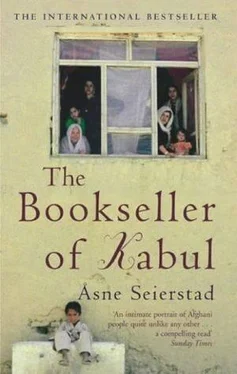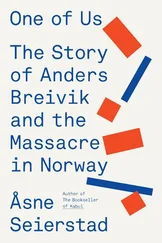Åsne Seierstad - The Bookseller of Kabul
Здесь есть возможность читать онлайн «Åsne Seierstad - The Bookseller of Kabul» весь текст электронной книги совершенно бесплатно (целиком полную версию без сокращений). В некоторых случаях можно слушать аудио, скачать через торрент в формате fb2 и присутствует краткое содержание. Жанр: Современная проза, на английском языке. Описание произведения, (предисловие) а так же отзывы посетителей доступны на портале библиотеки ЛибКат.
- Название:The Bookseller of Kabul
- Автор:
- Жанр:
- Год:неизвестен
- ISBN:нет данных
- Рейтинг книги:3 / 5. Голосов: 1
-
Избранное:Добавить в избранное
- Отзывы:
-
Ваша оценка:
The Bookseller of Kabul: краткое содержание, описание и аннотация
Предлагаем к чтению аннотацию, описание, краткое содержание или предисловие (зависит от того, что написал сам автор книги «The Bookseller of Kabul»). Если вы не нашли необходимую информацию о книге — напишите в комментариях, мы постараемся отыскать её.
‘A colourful portrait of people struggling to survive in the most brutal circumstances… bears witness to the power of literature to withstand even the most repressive regime’ Michael Arditti, Daily Mail
‘A compelling picture of a country which tragically continues to tear itself apart’ Sunday Telegraph
‘A triumph. From the terrors and complexities of courtship through the perilous cross-country pilgrimage by a guilt-addled son to the agonising fate of a thieving carpenter, these are compelling little dramas, mined from the resource of “every day life”… and peopled by characters who bristle with life and emotion and individuality…while their stories delight with the freshness of something foreign, they are both universal and intimately personal… [the] work’s outward simplicity is matched by a subtle and complex understanding: the quality of truth’ Scotsman
‘Magnificent… Beautifully written, it dares to bestride incompatible worlds. It is the best outsider tale I have read from within the bounds of Islamic life since Sarah Hobson’s Through Persia in Disguise, published twenty-nine years ago’ Scotland on Sunday
‘A unique insight into another world’ Daily Mirror
‘Moving and utterly gripping’ Big Issue in the North
‘A closely observed, affecting account… an admirable, revealing portrait of daily life in a country that Washington claims to have liberated but does not begin to understand’ Washington Post
‘Astounding… an international bestseller, it will likely stand as one of the best books of reportage of Afghan life after the fall of the Taliban’ Publishers Weekly
***
"In The Bookseller of Kabul, Asne Seierstad tries to answer the question: What kind of lives do Afghani men, women and children lead after the fall of the Taliban? She does this through a case study of one family. Economically, the Khans are not a typical Afghani family. The head, Sultan, owns bookstores in the country's capitol, and he is modestly wealthy. When the author, Asne Seierstad, first meets him, she is impressed by his seemingly liberal way of thinking, especially with respect to women. Seierstad thinks she might have struck a cultural anomaly in the male-dominated Afghan society and arranges to live with Sultan and his family to develop her story on life in Afghanistan.
During her four month stay with the Khans, Seierstad interviewed dozens of family members, went on a religious pilgrimage, and attended weddings. Through her interviews and experiences, she found that her first impression of Sultan was somewhat incorrect. While Sultan generally supposed women's rights, capitolism and other social liberties in his conversations with outsiders, he still keeps a firm, patriarchial grip on his family. Despite being wealthier that most Afghanis, Sultan refuses to send his sons to school, and instead forces them to work at his bookstore. He marries a second wife and exiled his
first wife to Pakistan where she had to live alone and keep his second house. Sultan's ruling arm also extended over his youngest sister, Lelia, whom he keeps in his home as a servant.
Each chapter of The Bookseller of Kabul focuses on a different member of the Khan family or a different event in the family's collective life. Through these individual stories, Seierstad creates her collage of what it is like to be a man, woman or child in Kabul, Afghanistan."












